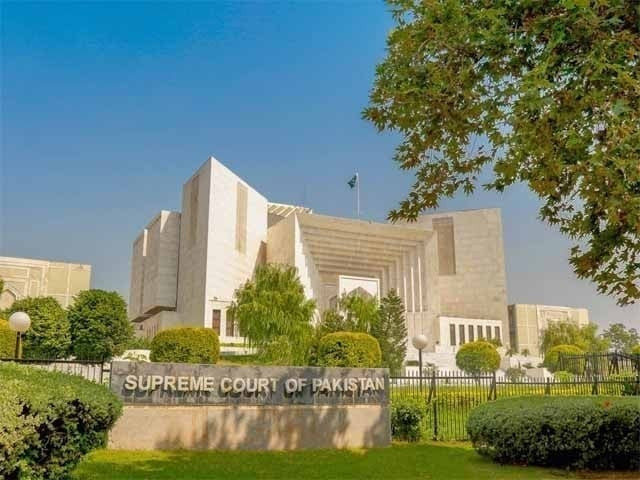
Supreme Court’s Justice Hasan Azhar Rizvi has declared that the provisions of subsection 2 of Section 5 of the SC (Practice and Procedure) Act -- providing the right of appeal to an aggrieved person against whom an order has been passed under clause (3) of Article 184 prior to the commencement of law – were ultra vires to Article 8 of the Constitution as they offended Articles 9, 10, 10-A, 24, and 25.
“To my understanding, the law must concerned with today's rights and not yesterday's. A legislature cannot legislate today concerning a situation that occurred 30 years ago and ignore the march of events and the constitutional rights accrued in the course of that period. That would be most arbitrary, unreasonable, and a negation of history,” Justice Rizvi wrote in his 13-page opinion against giving the right of appeal under Article 184 (3) retrospectively under the SC (Practice and Procedure) Act.
“Further, it is against the fundamental right of fair trial as enshrined in Article 10-A of the Constitution. Today's equals cannot be made unequal by saying that they were unequal 30 years ago and we will restore that position by making a law today and making it retrospective. Constitutional rights, constitutional obligations, and constitutional consequences cannot be tampered with that way,” he added.
Read Procedures act ‘strengthened judiciary’, says SC
Justice Rizvi also expressed the apprehension that giving the right of appeal retrospectively had the potential to open a “veritable floodgate” of claims and appeals pertaining to past transactions and concluded legal matters "There is no denial to the fact that every sovereign legislature possesses the right to make retrospective legislation.
The power to make laws includes the power to give it retrospective effect. However, normally, the legislation, which is not of a purely procedural nature, will not be given retrospective effect so as to take away vested rights of the parties. On a plain reading of the language of the provision, particularly, sub-section (2) of section 5 of the impugned Act, it becomes abundantly clear that the legislature’s intent is to provide the remedy of appeal against orders passed by this court, even predating the enactment or commencement of the impugned Act,” the opinion read.
“It is a settled principle of law that the right of appeal is a substantive right; hence, the retrospective expansion thereof raises significant apprehensions, as it threatens to disrupt the finality and certainty that has historically been attributed to judicial pronouncements. Such disruptions may have deleterious ramifications, not only in terms of the orderly administration of justice but also with respect to the stability and predictability of legal decisions,” he warned.
Read SC to share recorded proceedings on website
The judge wrote that because of these reasons, he disagreed with the majority opinion. "I cannot lose sight of the fact that the legislature has the power to impair and take away vested rights but within the limits set by Articles 4, 8, 9, 10 and 10-A in conjunction with Articles 24 and 25 of the Constitution. The limitation flows from the doctrine that the action of the State must be fair and reasonable.
Thus, the question, as to the validity of the retrospective law, is a matter to be judged on a consideration of the facts, the period of time, over which the retrospective law operates, the impact of the law on the vested rights, the public interest, the nature of the right, which is the subject matter of the law and the terms of the law.
Even otherwise, the validity of a legislative enactment, whether with retrospective effect or otherwise, shall always be subject to judicial review on the well-recognised principles of ultra vires, non-conformity with the Constitution or violation of the fundamental rights, or on any other available ground," he continued.
Justice Rizvi pointed out that the present Constitution came into force on August 14, 1973 and over the span of nearly five decades, so many cases had been adjudicated by the SC in the exercise of its power under clause 3 of Article 184. “It is a common practice that the aggrieved person would not be satisfied unless he exhausts all the remedies available to him under the existing law.
Read Parliament intended well in SC (Practice & Procedure) Act: CJ Isa
Even otherwise, the judgment or order passed under clause 3 of Article 184 of the Constitution, whether a review petition has been filed against it or if a period of thirty days has elapsed after the pronouncement thereof without a review filed by either party, could not be reopened and would be deemed to be a past and closed transaction,” he further wrote.
“For this reason, introducing a retrospective right of appeal now raises a profound concern. This could further compromise the principle of res judicata and jeopardise the stability and predictability of the legal system. It would open a floodgate of litigation and potentially overburden this court with the daunting task of reevaluating numerous pre-settled matters or rights which had accrued on account of determination validly made under the then-existing law,” he elaborated.
However, Justice Rizvi noted that this legislative framework would uphold the principles of fairness, transparency, and justice within our legal system. “Now, the independent judges, greater in numbers and uninvolved in the original case, have the opportunity to rehear and decide the matter. This not only reaffirms the core values of impartiality but also strengthens the integrity of the legal system by allowing for a fresh perspective when justice may not have been adequately served in the original proceedings,” he concluded.


1732266251-0/Josh-Brolin-(1)1732266251-0-165x106.webp)
1732266343-0/BeFunky-collage-(82)1732266343-0-165x106.webp)

1732263788-0/BeFunk_§_]__-(30)1732263788-0.jpg)
1732267954-0/Express-Tribune-(6)1732267954-0-270x192.webp)



1732258132-0/BeFunk_§_]__-(26)1732258132-0.jpg)










COMMENTS
Comments are moderated and generally will be posted if they are on-topic and not abusive.
For more information, please see our Comments FAQ